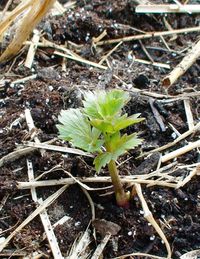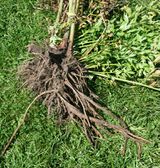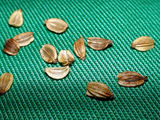Lovage
Garden Journal
- See also Garden Journal for a list with all plants with a garden journal section.
July 31, 2012 -
I have several lovage plants in my garden. I use the leaves for soups and sauces. The taste and smell are similar to celery.
This plant is easy to cultivate as long as you give them a well-drained soil with enough nutrients. Lovage is a perennial so once you have these plants in your garden, you can keep them. They are hardy against frost and the plants sprout as one of the earliest in spring. I conserve juice from lovage leaves with sea salt and this can be used to flavor many recipes. Because the roots go deep into the soil, the plant contains many minerals.
The roots that you see on the photo are of a two-year old plant that grew more than 2 meters high. The roots are about 50 cm long. I first harvested the seeds of the same plant, about 7 liters. The seeds can be used as a spice, similar to fennel seeds.
The roots contain a heavy, volatile oil, which are used to increase the blood flow to the kidneys. In traditional English folklore lovage root was used as a spell to bring love. Lovage root can treat many conditions. It is applied in the form of teas, herbal tablets and tinctures. It is said to help against jaundice, urinary difficulties, kidney stones and menstrual cramps. It is not recommended to be consumed by pregnant women.
Gallery
See also
External links
- Lovage Wikipedia
Comments
- You need to be logged into your Facebook account to post comments



